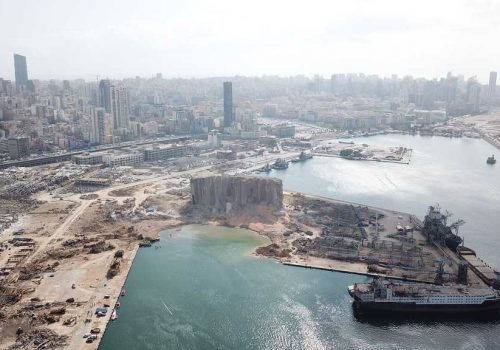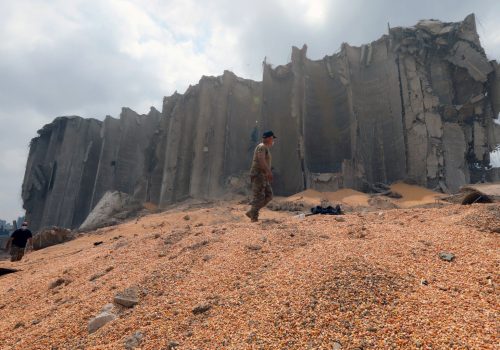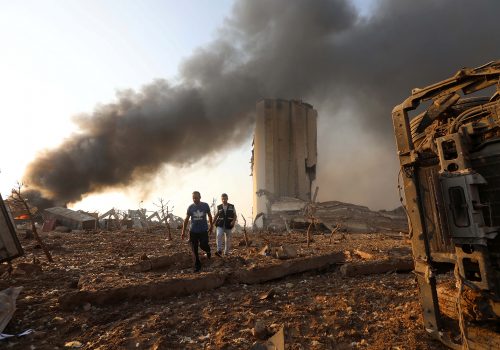UN-backed tribunal: ‘no evidence’ of Hezbollah leadership involved in assassination of Rafik Hariri
The Special Tribunal for Lebanon (STL), the United Nations-backed tribunal responsible for prosecuting the perpetrators of a terrorist attack that assassinated former Lebanese Prime Minister Rafik Hariri and twenty-one other people on February 14, 2005, has announced its long-awaited verdict. Fifteen years later, the tribunal found “no evidence” that the leadership of the US-designated militant group Hezbollah or the Syrian government were behind the assassination. However, the STL found
guilty “beyond a reasonable doubt” Hezbollah member Salim Jamil Ayyash of having organized and conducted the attack. Ayyash, who was tried in absentia, was also accused of the attempted killing of 226 people. The tribunal acquitted three other defendants in absentia, also members of Hezbollah.
The verdict was initially set to be announced on August 7 but was postponed after a massive explosion shook Beirut on August 4. The blast destroyed thousands of homes, killing nearly 180 people and injuring more than 6,000. Even before the explosion, Lebanon faced a severe economic and political crisis exacerbated by the coronavirus pandemic. The blast on August 4 reignited calls for the removal of an entrenched political leadership—including Hezbollah, which is said to maintain influence over the port. Ultimately, it remains to be seen what the verdict will mean for Lebanon amid a set of mounting and pressing crises with no end in sight.
Atlantic Council experts respond to the tribunal announcement and what it means for Lebanon:
“Back in 1779, Thomas Paine, the author of Common Sense, wrote that “silence becomes a kind of crime when it operates as a cover or an encouragement to the guilty.” Today all of Lebanon witnessed that particular type of crime, as the Special Tribunal chose to end its work after over a decade without answering the question of the ultimate responsibility for the assassination of Rafik Hariri.
“It does not require a conspiratorial mind to doubt whether justice has been served by closing the books after finding evidence to convict only one Hezbollah operative—who of course himself will never face any personal consequences. Very few things are certain about this investigation, but we can be confident that this verdict is not the result of simple incompetence. Rather, this outcome is the result of a concerted effort to obstruct justice through intimidation, threats, and assassinations. In the end, those with the ability to make such decisions apparently decided, as has often been the case, that truth would be placed subordinate to power, and justice would have to defer to the threat of war.
“In normal times, Hezbollah and Syria—as well as their indispensable benefactors in Tehran—would sleep well after such a verdict, comfortable in having been provided “encouragement to the guilty.” But these times are far from normal, and the explosion that ripped through Beirut earlier this month has forced Hezbollah on the defensive. The plain truth is that Hezbollah has spent decades working both to weaken the Lebanese state and to control the Lebanese political system and economy. It could not have succeeded to the degree that it has without the endemic corruption of Lebanon’s ruling class. But these very successes now mean that Hezbollah can no longer escape responsibility for Lebanon’s failings, no matter how hard it tries and no matter what help it receives. It is “common sense” today that the Lebanese people and the rest of the world should start holding Hezbollah to account.”
William F. Wechsler, director, Atlantic Council Rafik Hariri Center and Middle East Programs.
“The assassination of former Lebanese Prime Minister Rafik Hariri and the following investigation and trial began with a thunderous bang in downtown Beirut in 2005, but has ended fifteen years later with a whimper in a court room in The Netherlands.
“Three of the four accused (a fifth one, Mustafa Badreddine, died in mysterious circumstances in Syria in 2016) were acquitted. Only Salim Ayyash, an alleged senior Hezbollah officer, was found guilty on all counts. There had been concerns in Lebanon in the run up to the announcement that the verdict—if it found the accused guilty—could stir up trouble on the streets between partisan supporters of Hariri (and his son Saad) and Hezbollah. That was never very likely. The impact of the Hariri assassination—and the subsequent shock revelations that Hezbollah could have been involved—have dissipated over time. Today, it has been overshadowed by Lebanon’s economic collapse, the coronavirus pandemic, and the aftermath of an explosion on August 4 hundreds of times more destructive than the one that killed Hariri and twenty-one other people. Those Lebanese that oppose Hezbollah long ago concluded that the Iran-backed party was responsible. Those Lebanese that support Hezbollah have always subscribed to the position of its leader, Hassan Nasrallah, that the Special Tribunal for Lebanon was a Western plot directed against Hezbollah. It is true that, irrespective of the merits of the investigation and subsequent court proceedings, the whole process owes its existence to the political interests of the United States and France in 2005 which capitalized on the so-called Cedar Revolution in Beirut that helped compel Syrian President Bashar al-Assad to withdraw his troops from Lebanon. The investigation was seen as a means of placing pressure on the Assad regime, which was widely believed to have been the culprit. If Israel had been the prime suspect in Hariri’s death, there never would have been an international investigation, let alone tribunal.
“The prosecution’s case always carried a serious flaw in providing no motive for the accused to want to kill Hariri. Hezbollah, Syria, and Iran, of course, were not on trial. The investigation was only able to link five names to the assassination plot despite dozens of other people presumably being involved from the findings of the painstaking analysis of cell phone networks.
“The significance of the verdict, however, is that an alleged senior officer in Hezbollah has been found guilty. The tribunal said it had no evidence that the leadership of Syria and Hezbollah were involved in the assassination. But the natural extrapolation from the verdict is that Hezbollah, or elements within the organization, planned and carried out the assassination, presumably serving as the operational arm executing the wishes of Syria and Iran. No one is going to believe that Ayyash woke up one morning and thought it would be a good idea to kill a billionaire, five-times premier, and iconic Sunni leader. After all, despite having only four names in front of them (the actual accused are still at large), the tribunal made it abundantly clear that many more people were involved and Hariri was killed for reasons connected to the prevailing politics of the time.
“Still, the show is not over yet. The defense has a month to file an appeal and there is the possibility of further trials connected to other actual or attempted assassinations of Lebanese anti-Assad politicians and journalists around the same time as Hariri’s murder.”
Nicholas Blanford, nonresident senior fellow, Atlantic Council Scowcroft Middle East Security Initiative.
“The verdict of the Special Tribunal for Lebanon (STL) is irrelevant. The late Prime Minister Rafik Hariri’s assassins, Hezbollah and its ally the Assad regime, have escaped without consequence. This is unsurprising. Hezbollah and the Assad regime have orchestrated and overseen much worse with total impunity. Hezbollah continues to pay little, if any price, for the assassination, detention, displacement, defamation, and financial ruin of its enemies, domestically and abroad. The STL was never tasked with determining the guilt of Hezbollah’s leadership. Nonetheless they made several pronouncements exonerating the group’s leadership of orchestrating the assassination, thus giving the group a margin of plausible deniability for Hariri’s murder. Like so many instances of turning a blind eye to Hezbollah’s malign activities, this was also in the interest of furthering fictitious “political stability” in Lebanon as an end goal, rather than as a launching pad to solve the problem that Hezbollah’s parallel state and massive arsenal pose to the country. Despite the good intentions of the international community, this creates a protective barrier around Hezbollah, allowing it to continue its slow corrosion of the Lebanese state from within.”
Jomana Qaddour, nonresident senior fellow, Atlantic Council Rafik Hariri Center and Middle East Programs.
“From a political standpoint, the verdict feels like a judgment rendered a decade too late. An initial aim of the STL was to reveal the Syrian state’s meddling in Lebanon and the resulting violence. But following Bashar al-Assad’s crackdown on peaceful protesters that has resulted in nine years of civil war in Syria, hundreds of thousands killed and millions more displaced, laying bare the heavy-handed tactics of the Syrian state seems a moot point.
“Another aim was to establish responsibility for a political assassination in a country where political assassination has become the go-to method for settling scores in fractious politics. Some observers hoped that the gravity of an international probe could help bring an end to this destructive practice. However in the wake of widespread anti-government protests in October 2019, the plunging of the country into deep financial crisis and the tragic explosion in Beirut earlier this month, the political elite has revealed that their deeply entrenched corruption through mundane means can have just as corrosive an effect on the country’s future as any acts of terrorism could.
“However from a legal perspective, there is much about the court that is future leaning in its legacy. The evidence used to convict the accused Salim Jamil Ayyash was based on a complex cellphone network analysis. This did not provide much in the way of stirring testimony, especially in light of the fact that Ayyash and his three co-accused were tried in absentia, but it did set up standards and procedures for admission and analysis of digital evidence, which is being relied on more and more in criminal cases around the world.
“Additionally, there is the fact that the STL was the first tribunal of international character set up to adjudicate international crimes committed in the Middle East. This does not count the Iraqi High Tribunal (formerly the Iraqi Special Tribunal), set up in 2003 to try Saddam Hussein, which was an accountability mechanism with some internationalized elements but marred by opposition to its meting of the death penalty. In a region where impunity for human rights violations and atrocity crimes has proved rampant, the STL—however flawed—provides at least a glimmer of hope for greater accountability for crimes.
“What will probably be most enduring about the court, however, is its narrow focus on terrorism crimes, unusual for a criminal tribunal adjudicating international crimes, where similarly constituted courts tend to focus on war crimes, crimes against humanity and genocide. The use of legal frameworks to establish responsibility for terrorist acts has increased in domestic systems—often to much criticism for the way in which counterterrorism efforts can sometimes ride roughshod over individual rights. While based on Lebanese criminal law, the judgment still provides precedents for adjudication of terrorism crimes in other contexts, and may inform the need for a universal legal definition of terrorism, which remains elusive.”
Gissou Nia, nonresident fellow, Atlantic Council Middle East Programs, and human rights lawyer.
“After fifteen years and amidst the sorrow of a catastrophic explosion, the delivery of justice on the assassination of former Prime Minister Rafik Hariri and others may only come, unfortunately, in the form of a symbolic verdict without real consequences for the perpetrators. However, it is precisely events such as the blast in the port in Beirut on August 4 that brings back painful memories to many Lebanese of injustice, impunity, negligence, and corruption despite the years. The guilty verdict against one Hezbollah “supporter” was already expected to inflame sectarian tensions, as it did at the time of the assassination. Yet, the explosion also leaves Lebanon to deal with an exacerbated humanitarian and economic crisis by hitting the main port of a country almost fully dependent on imports, leaving some, perhaps, with little regard to the outcome of today’s verdict.
“However, for Lebanese the verdict will be seen as a day of much-delayed justice and (widely known) truth for the country, despite its mostly symbolic character. More importantly, a verdict of this nature should make the European Union (EU) reevaluate its posture towards Hezbollah, especially France, which still maintains a distinction—not even recognized by Hezbollah itself—between the group’s political and military wing. Hezbollah, which is said to maintain large control over Beirut’s port, is again at the center of collective anger—along with many other politicians—and is likely to come under stronger scrutiny and anti-Hezbollah sentiment after the verdict.
“Nowadays, the economic crisis and Iran’s efforts to commandeer Lebanese affairs and the funding of Hezbollah have led the country on a fast track towards becoming a failed state. Now under a humanitarian crisis, mounting losses, and a sense of never-ending collective grief, many Lebanese feel exhausted, yet with the inherent resolve for much-needed change and justice.”
Joze Pelayo, program assistant, Atlantic Council Scowcroft Middle East Security Initiative.
Further reading
Image: Workers prepare a giant poster depicting Lebanon's assassinated former prime minister Rafik al-Hariri, in downtown Beirut, Lebanon February 12, 2010. REUTERS/ Mohamed Azakir/File Photo


